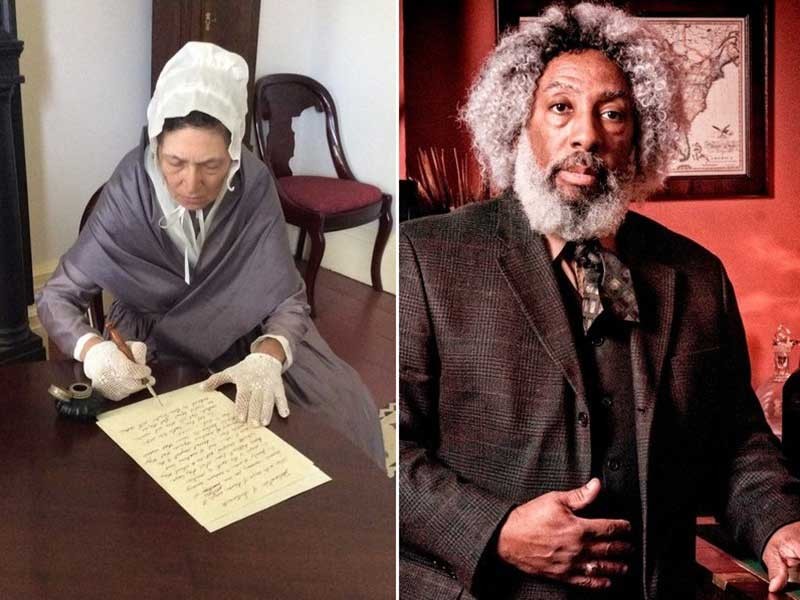‘Living historians’ event re-enacts Frederick Douglass and Lucretia Mott
Actors or “reenactors” portraying Frederick Douglass and Lucretia Mott spoke at an event on Monday in the Utah State University Eccles Conference Center. Topics included detailed biographies of the characters and their connection to the issues currently facing the country.
Abolitionist Frederick Douglass, portrayed by Nathan Richardson, was born into slavery in February, 1818. He did not know the exact date of his birth, as slaves’ birthdays were not recognized. In addition, when he was born his mother was sold to a neighborhood plantation and had to walk 24 miles round-trip to rock him to sleep at night.
Douglass eventually escaped slavery and became one of the greatest orators of his time, challenging the idea that a slave could not be educated.
Douglass taught himself to read and encouraged everyone in the audience to open and free their mind because, “Once your mind is free, your body has to follow,” Richardson said.
Suffragist Lucretia Mott (portrayed by Renee-Noelle Felice) was born in the late 1700’s and was an avid women’s rights activist. Mott joined the anti-slavery movement with abolitionists such as Douglass and co-founded the American Anti-Slavery Society.
Among her many accomplishments, Mott helped draft the famous Declaration of Sentiments. The document, which was produced in Seneca Falls, New York, advocates for the political, social, civil and religious rights of women.
Douglass and Mott worked together on many issues, including the Declaration of Sentiments.
During their respective speeches, the historians were able to relate some of the issues of the past with the problems in the present.
Mott, for example, was furious when she found out her university paid female employees less than male employees. Through this realization however, she discovered the importance of allies. “When you are organizing and feel that many are against you, allies are required,” Felice said.
Richardson and Felice also spoke about privilege and how to use it as an ally.
The pair concluded their segment by talking about having difficult conversations with political opponents.
During his life, Douglass, though he was criticized for it, reached out to have conversations across the political aisle. He even engaged in dialogue with slave owners and stressed the importance of seeking the truth, above all else.
Speeches were followed by a question and answer session. When asked how to stay the course for civil rights and activism, Douglass responded that people need to read and study the constitution. “Many Americans cannot even name the amendment that gave women the right to vote,” Richardson said.
Felice said people need to look inward and ask, “what am I doing to make change as an individual?”
“We’re hoping that many of the things they will bring out from the 1800s will resonate today,” Cathy Bullock, journalism and communication department head, said.
Bullock also said people who are up to date with current events should be able to see parallels in the reenactment that took place.
This event was hosted by the Mountain West Center for Regional Studies in the College of Humanities and Social Sciences. The department sponsored the event as part of the Bennion Teacher’s workshop, or Workshop for the Perpetuation of Democratic Principles.
The workshop will conclude on Friday at 9:30 a.m. with a mock revival of the Declaration of Sentiments and a march to historic downtown Logan.
taylorcripe@gmail.com
@cripe_taylor

